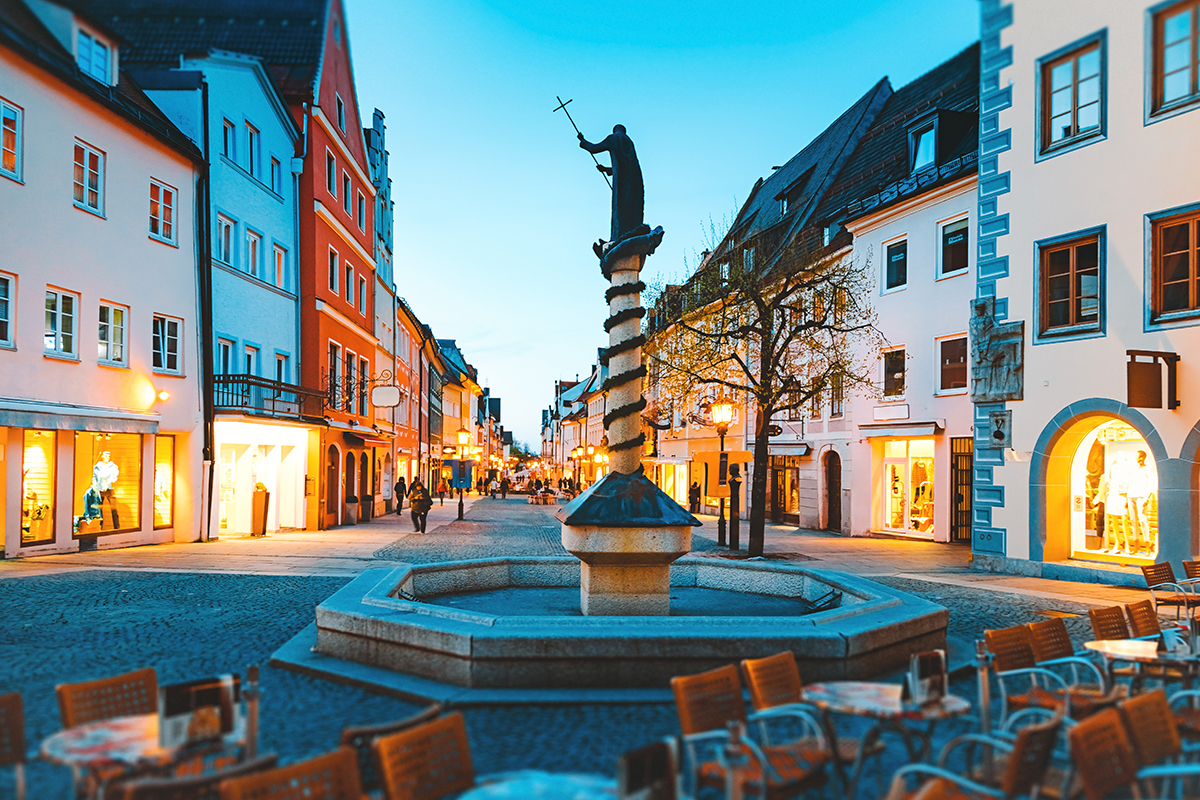“Bist du Katholisch oder Evangelisch?” the petite woman at the desk inquired in German as I handed over my marriage certificate. “Are you Catholic or Evangelical?” My husband and I, recently relocated to Germany from the U.S., were registering our wedding certificate in his village, tucked into the foothills of the Alps with a “Founded in 795” shield.
I balked at the inquiry, peering at my husband for support, and answered, “Neither? Is that possible? I’m Jewish.” Her cheeks reddened as she filled out “Sonstiges” — the category meaning “other” or “miscellaneous” — quickly assuring me it was to my benefit as I wouldn’t have to pay taxes that funded the Catholic or Christian churches in my new home. Still, I found the question hard to shake and her embarrassed reaction hard to forget.
My husband and I met in Washington, D.C., where he dutifully and lovingly learned everything he could about Judaism. He is from a small village in Bavaria (Southern Germany) and met Jewish people for the first time when he moved to Israel to study abroad during his time at university. With great interest, he came with me to Shabbat services, recited the Mourner’s Kaddish in the year after my dad passed away, helped slice the apples for Rosh Hashanah dinner. We were married under a chuppah built by friends and family in a mixed-faith service, where we sang German Catholic hymnals in the same breath as Hebrew incantations.
While we were in D.C., we would fly over to see his family in his small Bavarian village every six months, aptly named “Field Church.” The center of town is dictated by the church’s placement, the highways are adorned with wooden sculptures of Jesus hanging on a cross, the most common salutation is quite literally, “Greet God!” Catholicism and culture have blended into an indiscernible sameness, where Catholic rituals are seen as “cultural” and performed by people who are otherwise non-religious, despite their very obvious religiosity to outsiders. Catholicism is the air you breathe in many ways — it informs the rituals, the holidays (of which there are many), the vernacular, the mindset.
My husband’s parents don’t even realize things are Catholic — they send me greetings on feast days like “Jesus’ Ascension Day” and “The Assumption of the Blessed Virgin Mary,” mailing us Advent wreaths to mark the days until Jesus’ birth every week in December. These gestures are devoid of Catholic meaning when directed at me, but Catholic all the same. It is not out of disrespect for my Judaism — on the contrary, it is inclusive and familial — but rather borne out of there being no experience with an “other,” someone who does not have the same traditions as them.
In the village, I have been on the receiving end of “Bist du Katolisch oder Evangelisch?” twice — once at the marriage registration bureau, and once at my husband’s Oma’s kitchen table. Out of the blue, she leaned in over her apple cake and coffee, posing the question, “Are you Catholic?” A moment of pause ensued as I looked to my husband for counsel. My German was rather basic at this point but I did know how to explain that I was not Catholic. I shook my head and she nodded in understanding, “Of course, then. Evangelical.” I shook my head again and meekly, in English, offered, “I’m actually Jewish.” The table was quiet while my husband translated, the recognition creeping across the faces of his grandparents.
Almost as quickly as it dawned, they lurched into apologies, apologizing for what happened, apologizing for “that era” in German history, apologizing for the grave loss. I was apologizing simultaneously, apologizing for their apologizing, apologizing for their discomfort. It became one of the stories that my husband and I shared with our friends, at dinner tables, who chuckle or groan or both at the idea of it.
But that moment encapsulated two common themes of the modern Jewish experience in Germany: unfamiliarity and guilt. And it doesn’t just happen in the small villages here — we now live in Berlin, and I experience the combination of unknowing and guilt all the same. Most of my husband’s friends, growing up across regions in Germany and cities of varying sizes, had never really met a Jewish person until they moved abroad or met me.
Of the 83 million people in Germany, 230,000 are Jewish. The community is varied, a mosaic of Holocaust descendants, refugees of the Former Soviet Union and recent Israeli immigrants. The influx of people into the community has revitalized it in many ways — in fact, Berlin boasts the fastest growing Jewish population in the world. Young German Jews talk about a changing narrative, where they no longer exist in the mentality of “always having a bag packed,” but still feel like they are other.
It is important to acknowledge that Germany has done a tremendous job of teaching its history, and teaching its citizens to engage with it critically. In Germany, the Holocaust is the one educational theme on which each of the 16 federal states collaborate. It is mandated in history and civics classes, but its coverage extends to literature, ethics, and religion lessons. Most schoolchildren visit a concentration camp and in my husband’s school system, that visit was mandatory.
This learning, while crucial and invaluable, also tends to relegate Jews to the past. In doing so, Jews become historical figures and figments, rather than community members living alongside them in the here and now. They are figures in the tragic history of a nation and their living ghosts wrack the majority of German hearts with grief and guilt.
Germany is not unique in this unfamiliarity, but I believe the guilt is a uniquely German phenomenon. I have heard it from many Jewish friends living here — that their declaration of Judaism is often followed by hurried apologies, a sense of shame, a laundry list of Jewish museums the person has visited. I’m taking an anti-racism course through a Jewish lens at the moment and we spoke about this very concept last night: the fossilizing nature of guilt. Guilt tends to freeze people in time, in a moment, in a concept, in a thought pattern. Jews are connected to the worst moment in this nation’s long history and its citizens relive the Jewish story through this connection.
I think Germany is party to the contemporary global process of reckoning: one of acknowledging and dismantling systems of privilege, confronting assumptions and learned perspectives, and engaging with one another to build something better, more equitable. I believe there is room for German students to learn not just about Jewish history and experience the painful emotions connected to it but to also engage with Jewish presence in their own national community. Fewer museums visits and more Shabbat tables, perhaps. Learning how to see others as community members, not separate or historical entities. Continued support for initiatives like the provocatively-named “Rent-A-Jew,” where young Jewish volunteers speak with young people about what it is like to be Jewish in Germany today, not historically.
It’s clear, from the commitment to learning about the Holocaust and the guilt I sense from anyone who learns I’m a Jew, that Germany is reckoning with its history in an effort to never let it happen again. But to truly move forward, we must not only look to history, but to the people living and breathing at this very moment, infusing the country with a new kind of culture, a new hyphenated identity. Germany, and the plentiful diverse communities within it, stand to benefit from the relationships built while sitting at the same table, Shabbat or otherwise.



